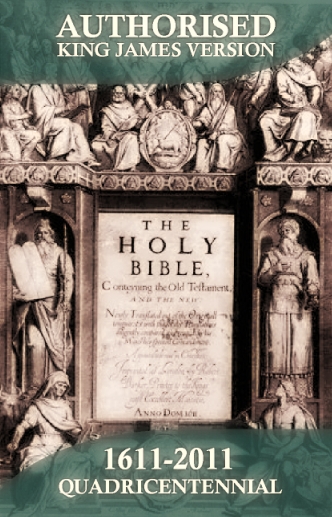It is no presumption to elevate the King James Version to the level of masterpiece.1 Indeed, the voices raised in praise of the King James Version during this 400th anniversary celebration are myriad (BBC, NPR, More NPR, Buckingham Palace, major newspapers around the world, etc.). The KJV, along with the works of William Shakespeare, has had more of an influence on the English language than perhaps any other work.
 Fundamentalist historian David Beale exclaims “The extent of influence—both immediate and permanent—which the King James Version has had on English literature cannot be exaggerated.”2
Fundamentalist historian David Beale exclaims “The extent of influence—both immediate and permanent—which the King James Version has had on English literature cannot be exaggerated.”2
Influence on vocabulary
The KJV broke upon the world of English at a time when that world was ready to be shaped. Alister McGrath, in his excellent book In the Beginning: The Story of the King James Bible, said “The King James Bible was published within a window of opportunity, which allowed it to exercise a substantial and decisive influence over the shaping of the English language.”3
For instance, the KJV proved to be influential in settling how the English language would handle foreign words. The willingness of the translators to accept or adapt words from Latin (e.g. inspiration), Greek, and Hebrew have led to an English that has been willing to accept tens of thousands of words from donor languages such as French and German as well as the classical languages.
For example, there are thousands of English words that come from French (e.g. abandon, abbreviation, music, nurse, present, etc.).4
Additionally, Greek and Latin roots are often used in neologisms (inventions of new words). For instance, “telephone” comes from two Greek words meaning distance and sound and “philanthropist” comes from two Greek words meaning love and man. This approach to foreign words, bequeathed to the English language largely by the KJV, has allowed English to change and adapt to become the dominant language of the modern world.
Another area in which the KJV has influenced English vocabulary is the many Greek and Hebrew idioms that have found their way into the English language via the KJV.
- “To fall flat on one’s face” (Numbers 22:31)
- “To pour out one’s heart” (Psalm 62:8)
- “The land of the living” (Job 28:13)
- “Sour grapes” (Ezekiel 18:2)
- “From time to time” (Ezekiel 4:10)
- “A drop in the bucket” (Isaiah 40:15)
- “The powers that be” (Romans 13:1)
- “A thorn in the flesh” (2 Corinthians 12:7)5
Dozens—perhaps hundreds—of additional examples could be given.
Standardisation of spelling
The KJV was also highly influential in the standardisation of English spelling.6 Less than a century before the publication of the KJV in 1611, when William Tyndale completed his 1534 translation of the New Testament, English spelling was still quite variable. Indeed, Tyndale used varying spellings of the same words within his translation.7 Even Tyndale’s own name was spelled in various ways during his lifetime (Tindal, Tyndale, Tynedale, etc.).8
Even though the KJV contains some variation in spelling (mostly proper nouns), it demonstrated general internal consistency and lent its massive popular influence to the standardisation process.
Cultural influence
I spoke recently to a professional who only gave up Agnosticism because it was too dogmatic, yet this highly educated unbeliever pointed out to me that it is essential to be familiar with the King James Version in order to properly understand English language and culture. He was right.
Indeed, culture is embedded in language. McGrath addresses this interrelationship.
“The King James Bible was a landmark in the history of the English language, and an inspiration to poets, dramatists, artists, and politicians. … Many families could afford only one book—a Bible, in whose pages parents recorded the births of their children, and found solace at their deaths. Countless youngsters learned to read by mouthing the words they found in the only book their family possessed—the King James Bible. … Without the King James Bible, there would have been no Paradise Lost, no Pilgrim’s Progress, no Handel’s Messiah, no Negro spirituals, and no Gettysburg Address. These, and innumerable other works, were inspired by the language of this Bible. Without this Bible, the culture of the English-speaking world would have been immeasurably impoverished.”9
Indeed, it is fitting that a translation of the greatest book ever written—The word of God—should hold such a place of influence in our culture.
When the first KJV came off the press in 1611, the English world was doubly blessed. Not only did we receive an improved translation of God’s word in our common language, but we also received a work of art which would shape and refine our language and culture for centuries to come.
Grace to you.

1 To proclaim the King James Version a literary masterpiece in no way detracts from the fact that it is God’s Word.
2 Beale, David. A Pictorial History of Our English Bible. Greenville, SC: Bob Jones University Press, 1982, p. 47.
3 McGrath, Alister. In the Beginning: The Story of the King James Bible. London: Hodder & Stoughton, 2001, p. 258.
4 There is irony and example in the fact of having two Latin imports (e.g. and etc.) in this sentence.
5 Adapted from McGrath, pp. 263-264.
6 Kemmer, Suzanne (2009). “The History of English.” Taken from https://www.ruf.rice.edu/~kemmer/Histengl/spelling.html on 26 January, 2011.
7 Daniell, David. Tyndale’s New Testament. London: Yale University Press, 1989, p. xxx.
8 Edwards, Brian. God’s Outlaw. Wheaton: Tyndale House Publishers, 1981, pp. 29, 72.
9 McGrath, pp. 1-2.
About Jason Harris
One Comment
Comments are closed.


Thanks for this excellent piece.